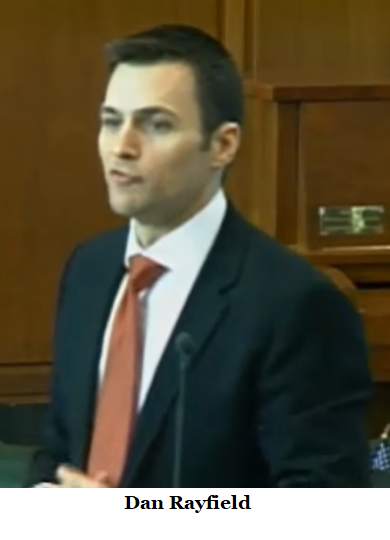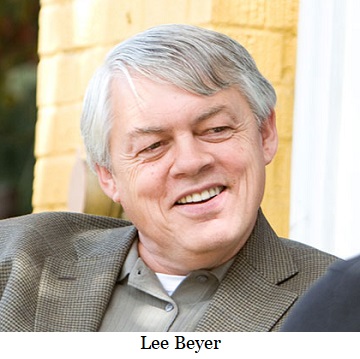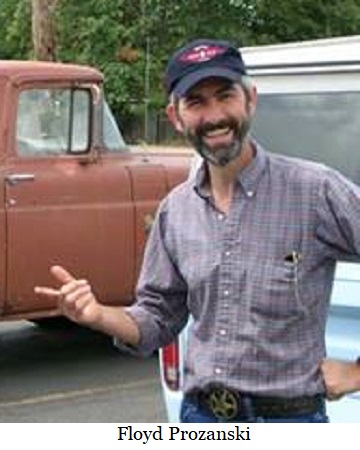Let’s get to know our neighbors
In 2008, a friend and I chose to visit Japan to see a high school buddy of mine who had expatriated and been teaching English there for 6 years. While there we took a few days to go out to the country. First we went to Nikko, a small town north of Tokyo, which has some incredible shrines. Later, I split off on my own and went to a small coastal town called Shimoda, which is a small local hotspot for surfing.
I love history, and Shimoda is the port which Admiral Perry sailed into in 1853 making a very strong case that the Japanese should be interested in what the west was selling. He did so by showing them how the American west was won. Big cannons, with lots of powder. In truly Japanese fashion they still celebrate the festival of Black Ships with sister city Newport, Rhode Island where Perry was born. They celebrate the day Japan more or less had its borders forced open by western military technology.
Before I left Tokyo, my host, who had been in Tokyo and Yokohama for most of his time in Japan could not understand my need to get out of the city. “Kropfster, you grew up in the country. Country people are all the same whether it’s here or there.†Cities are where there’s a real difference in culture he inferred. I cannot say for sure that I totally agreed with him, but his point holds merit. We had grown up together in the same one stoplight town in the central Willamette Valley.
There is a similarity in people that live in the smaller towns and in the country, isn’t there?
It's a slower way of life, and a different set of priorities. In some sense, my trip to the Japanese countryside confirmed this. I think there is a common misconception that people from the countryside are more small minded, and racist.
While in the Tokyo’s tourist districts, I was certainly exposed to racism. I actually heard first hand a loudspeaker van go through a huge tourist area saying “Japan is for the Japanese, you should all go home.†I was even able to offer that interpretation to our host while knowing almost no Japanese. He confirmed it was the “nice†version of what was said. Fascism seems to sound the same no matter the costume worn. Also, the costume in this case had lots of striking well understood symbolism. Bright colors and hard lines in red white and black. Some communications do not depend on words.
In the Japanese countryside, I got to experience a different sort of racism, being denied services, as a local hospice agent placed my reservation, only to confirm that the BnB owner was ok with a “gaijin†guest. She was not. In a lot of ways, I’m far more comfortable with the second situation than the first. I would have hated staying somewhere I was not wanted.
The next proprietor was more than happy to have me and I found my way to that Bed n Breakfast, which in the Japanese countryside could be called a Futon and Fish. I was relieved to find a place to stay. I had actually considered that I might have to find a ditch to crash in, as I had done my usual amount of planning and preparation for the trip. None.
My host tried to give me breakfast in the morning, but I couldn’t stomach fish and rice with broth for breakfast. The head was still attached to the body of the fish, and I was not feeling adventurous.
To be fair, I think there was a fried egg in the broth. She expressed a rigorous concern that I would not make it through the day, and mostly in sign language she let me know that I was far too big to skip breakfast. “You sooooooo beeeeeeeeeeeg.†Her english far surpassed my Japanese. The point was made, and I politely made my exit.
I remember fondly that trip to Japan. And though my friend could not quite understand why I would want to spend time in the countryside, I am very glad I did. It was a nice slowdown from the hustle of late night drinking and socializing in Tokyo’s Roppongi Hills district. I was also afforded a different set of experiences that could not have happened in the city. I got a perspective on the world wherein my understanding of the contexts of our individual lives got some definition. I started to understand my friend’s perspective.
The border of Russia and Mexico
I currently live in a bit of an odd place along the border of Russia and Mexico. Tha is a simplification. Many of my neighbors are from Guatemala, Ukraine, Nicaraugua, or actually from Russia or Mexico.
Gervais, Oregon sits 5 minutes south of Woodburn and 15 minutes north of Salem. A heavily rural and agricultural economy abounds. There are greenhouses, farms, tree and nut production. The area represents an interesting cross-section of America in the early 21st century. The perspective here is enjoyable and unpredictable.
Many of the people here are guided by faith. Other than sub-century immigrants, the families tend to be of German or French Catholic descent, creating a lot of mixed Catholic cultures. There are a fair number of “old believer†Russians, and the beautiful churches accent the skyline with Mount Hood framed in the distance on clear days. The scenery is gorgeous, and the mix of cultures is refreshing, as are the attitudes.
A D V E R T I S E M E N T

A D V E R T I S E M E N T
As a transplant to the area I have my own perspective as well. I have my hands in many arenas, and have a diverse group of friends. I was raised Mennonite until the age of 6, and culturally for my entire upbringing. Mennonites, a sect of anabaptism, (not anti-baptist) are a somewhat diverse group in and of themselves. The majority are very conservative, agrarian, and culturally separated from larger society. Most adhere to a strict way of life which prohibits involvement in organized sports, competition or politics. The very strictest and most well known are Amish.
Malcolm Gladwell, whose parents converted when he was a child, describes them as a sort of American Christianity with Jewish traditions and roots.
My dad laughed at this description with familiarity when I relayed it to him. He had never heard it put this way, and could not help but agree. “Those (traditional Jewish) are our stories and traditions,†he acknowledged.
In many ways, Mennonites live as immigrants in whatever land they choose to live, another commonality with the Jewish heritage they embody.
Over the past election cycles I’ve witnessed notable phenomena. In 2016, I recall talking to friends in Eugene that could not conceive of how Donald Trump had won election. I pointed out to them that where they live represents a specific bubble, and that they get insulated from outside perspectives.
Rural Americans don’t think like suburban or metropolitan Americans. When you live in the country or in small towns, priorities are different. Which is in no way to say that people from specific areas all think the same. In fact, that’s the point I’ll get to by the end. I consider myself a bit of an amalgamation in that I grew up country, went to college in a small town, and lived in both a small city and a larger city at different points in my life. I’ve also had the benefit of visiting some of the world’s largest metropoli.
Living in a largely immigrant cultural area affords a perspective on the differences in the way immigrants and think compared to the way established cultures think they think. I know that's a mouthful, or a mind full. Generally, I find that people from large cities think that people from rural areas ought to share their values. And, if that is not the case, they assume that minorities from rural areas will have similar values to their own.
It is not only a narrow understanding, but also a grossly negligent, and in some cases racist viewpoint on the part of my well meaning friends from the city. I often cite a conversation I had with a friend that immigrated from Nicaragua over 30 years ago.
She and I were talking about the election in 2016 when Mr. Trump was campaigning on a promise to fulfill on the proposed border wall from 2006 legislation. My assumption was that my friend would not support building a wall, and I could not have been more wrong.
“Well,†my friend related “ what I remember of Nicaragua was not positive to say the least. It was a hell we escaped, and we were lucky to get out alive. As far as I’m concerned, build that wall, there are bad people down there, and I support any measure of protection from them we can get. Americans don’t understand what that looks like. Sandinistas were truly awful.â€
I’ve relayed this conversation to multiple friends over the years. Usually I’m giving this as an example of why we cannot make assumptions about people’s political beliefs. Belief comes from context, context comes from experience, or at least the story we tell around the experience. A lot of immigrants have had awful experiences that don’t have them align with party line politics on either side. It turns out that Cuban and Vietnamese immigrants tend to be very skeptical of communism and socialism for instance.
In large part, Democrats and the “left†are guilty of this to a greater degree than their R counterparts. Though in large part, the assumption is the same in both cases, and that assumption is that minorities vote left. At the end of relaying my story, I have often heard some version of the following: “so they vote against their own people?â€
I usually try to point out that they do not for a second think they are “voting against their own people.†They want to be here, and they are Americans (the USA kind, no offense to our neighbors). They don’t view it as “their peopleâ€. They are us, and are acting upon their own best interests, whether we agree with them individually or not. Likely, there is a belief that they are acting in defense of the United States, their adopted country. They came for the American dream, and to flee people that would have oppressed them.
This is a context I feel many people would be well served to understand, even if it may be difficult. Perhaps immigrants understand better than any what “Us and Them†really looks like. Or doesn’t. Immigrants often come here to relate to people on a level of equal philosophy, and to have a bond in a new country that they believe is linked by common ideology instead of being falsely divided by race and culture.
We need a new diversity- not one based on biological characteristics and identity politics but a diversity of opinion and worldviews.
Ayaan Hirsi Ali
I personally think a new paradigm could be emerging in which political analysts finally abandon racial assumptions. I encourage all of us to do so. The last two elections have certainly challenged what many think along these lines. Progressive liberals have been hard pressed to understand why Latin and African Americans have voted in historically large numbers for Donald Trump.
Race and culture certainly color our individual perspectives. So do things like our pace of life, and access to having our assumptions challenged through exposure to new views and attitudes. I believe things like rural / city are another lens through which opinions and attitudes become contrasted and understood.
Many immigrants understand America, at least the USA and Canada, as places where they can voice their opinions freely and be judged by their character and actions instead of by the color of their skin or any other indication of where their lives may have begun. They most likely hold their beliefs and opinions with reasons all their own. Not understanding them, does not mean they are illogical.
We could assume political beliefs or biases based upon where people live and likely be more accurate than making assumptions based on race. Let’s not do that though either. Let's not assume we know what people think. Especially in Oregon where my Trump supporting friends also strongly backed legalizing mushrooms for psychiatric treatment. Oregon, where my NRA member friends with concealed carry permits have been active members in the Portland Pride community. Oregon, where socialist rednecks are a real thing.
Assumptions are not just toxic, they are profoundly lacking in nuance and understanding and likely inaccurate. Let's get to know our neighbors and see if we might actually be able to understand where they are coming from.
--Jeremy Kropf| Post Date: 2021-02-23 11:12:15 | Last Update: 2021-02-23 12:29:30 |
...And another and then to a coverup.
Each legislative session many bills are proposed to change human behavior in the hopes that the climate will change to match someone’s idea of a utopian world. Gordon Fulks, PhD. of Corbett, OR is an astrophysicist. For the last decade he has addressed concerns about global warming with a presentation of the subject in terms the layman can understand. To the extent the topic is divisive he is welcomed or shunned. A true scientist, his teaching hasn’t changed because the science behind it hasn’t changed. He does respond to how others spin the message for effect.
The research that Fulks relies on is key to scientific understanding. He relies on sturdy temperature reconstructions from the Greenland ice cores. Those reconstructions cover tens of thousands of years and show relatively recent Minoan, 1000 B.C., Roman at time of Christ, Medieval, 1000 A.D. and today’s Modern warming periods. Each is spaced about one thousand years apart and each experienced higher temperatures ranges than we do currently. They do show that our current warming period is cooler than the three previous ones.
The numbers on the left show temperatures in central Greenland at the time intervals on the base line. The U.N.’s International Panel on Climate Change UN/IPCC working with many universities worldwide, created over 100 computer models beginning in the late 1970’s to predict temperature changes in the twenty some years to follow. All of those computer models used the premise that rising CO2 levels would create rising planet temperature GAST. Every model failed spectacularly as shown below. They show that there is no correlation between the rise of CO2 levels and the rise in Earth’s GAST.
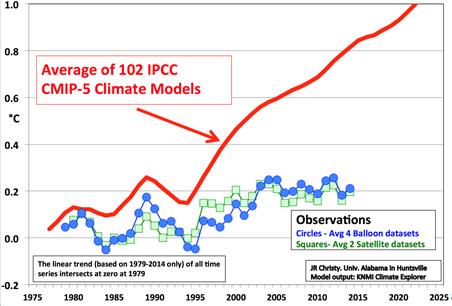
.
With future funding from the United Nations at stake, Penn State, East Anglia and many other universities wouldn’t acknowledge that their theory relating CO2 levels to temperature was incorrect. Choosing to follow their funding versus following the science these IPCC members proceeded to alter temperature readings from around the globe. They were caught in the coverup. That was called Climategate, it occurred in 2009 and resulted in the dismissal of the head of the IPCC. After that the UN/IPCC dropped the reference to global warming and adopted the term climate change.
During that time interval real temperatures rose slightly but well within a range of normal variation. The IPCC accidently proved their premise to be incorrect, that rising CO2 levels will produce rising Earth temperatures, but they persists in this false premise to this day. It is the bedrock argument for eliminating carbon-based energy, a key to globalists tightening controls over human activity. Measured Earth CO2 levels did rise from 280 parts per million to 420 parts per million in those 25 years of computer modeling. The rise did not produce a corresponding rise in temperatures. It did produce a 17% increase in vegetation globally and hunger worldwide was sharply reduced. For perspective, the CO2 levels experienced by crew members on a Navy submarine are near 5000 parts per million.
The temperatures on Earth are most affected by celestial conditions, things astrophysicists study. The major ones being the Earth’s elliptical orbit, exaggerated by gravitational pull from our largest neighbors, Jupiter and Saturn and by forces experienced in the movement of our solar system as it travels through The Milky Way. https://www.theplanetstoday.com/ Constantly changing conditions of activity by our sun with its active and quiet periods correspond most to temperature conditions on Earth. When you make legislation based on a false premise -- humans cause global warming -- that relies on another false premise -- rising CO2 levels cause GAST to rise -- you can only do harm.
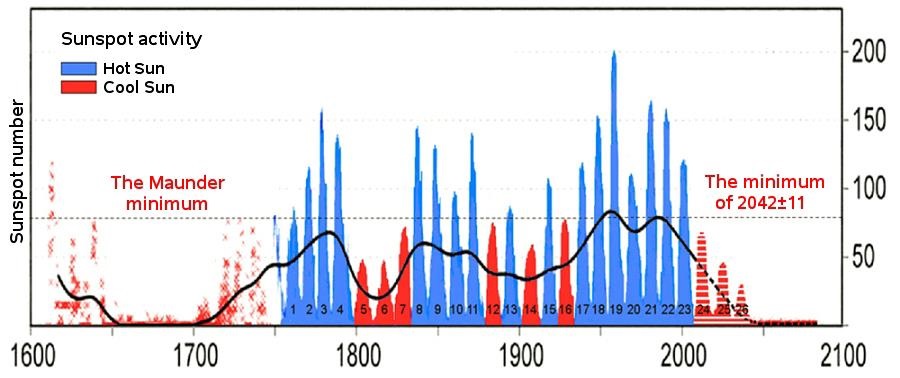
There is a third false premise involved here as well. That is that humans can control the level of CO2 on Earth. One volcanic emissions can equal the CO2 created by all humans each year and we have hundreds of volcanic events both above and below the sea each year. Do any of those legislators or those they speak for have the requisite science background to act with authority on proposed climate legislation? Do they presume their scare tactics have worked? Do they presume skeptics are too intimidated to speak up?
--Tom Hammer| Post Date: 2021-02-23 09:27:25 | Last Update: 2021-02-23 14:40:13 |
Six to one match on small dollar donations
It seems there is a proposal in the Oregon legislature that would make a significant change to Oregon election law.
While the Oregon's Secretary of State and many local county elections officials have celebrated what a good and secure system Oregon has, Democrats in Oregon may be attempting to put yet another "thumb on the scale" to further influence Oregon's election processes.
Legislation has been put forth that would see taxpayer money partially funding campaigns for political office. The proposal comes from Representative Dan Rayfield (D-Corvallis), who is sponsoring the bill. Representative Rayfield has recently proposed additional changes to Oregon election law in a state where his own party rules with a super-majority.
Despite this election stronghold, the Democrat wants to fundamentally change how elections and votes work in the state of Oregon.
HB 2921 would seem to create yet another government bureaucracy in the "Small Donor Elections Program".
It would also require taxpayer funding of political campaigns of a possible 6-to-1 ratio.
The bill is currently summarized as follows:
Establishes Small Donor Elections Program to enable candidates for office of state Representative and state Senator to receive 6-to-1 match on small dollar donations. Limits matching funds. Takes effect on 91st day following adjournment sine die.
The Oregon legislature is currently in session, although the public has been banned from the state's capitol building.
--Bruce Armstrong| Post Date: 2021-02-23 09:17:10 | Last Update: 2021-02-23 19:27:35 |
“A pharmacy tourism programâ€
“White Privilege†is something we hear a lot about these days, but it seems that Senator Lee Beyer (D-Springfield) missed the memo when he introduced
SB 12, requiring benefit plans offered by the Public Employees’ Benefit Board and Oregon Educators Benefit Board to cover certain costs related to travel to Mexico or Canada to fill and refill prescriptions.
SB 12 states:
Benefit plans offered by the Public Employees’ Benefit Board that reimburse the cost of prescription drugs must include a pharmacy tourism program that allows an eligible employee or family member, who is not enrolled in Medicare, to fill and refill in Mexico or Canada 90-day supplies of prescription drugs specified by the board. The program must pay the costs of:
(a) The specified prescription drugs;
(b) Round-trip air travel to San Diego International Airport or Vancouver International Airport;
(c) Transportation to and from a pharmacy designated by the board; and
(d) An overnight hotel stay, if necessary.
It doesn’t stop there. It requires the boards to coordinate the travel making them travel agents calling it a “pharmacy tourism program.â€
The FDA reported in 2017 that imported prescription drugs are neither safe nor dependable. Foreign drug makers are notorious for producing untested counterfeit drugs, even in unsterile conditions, then cheating international trade rules to hide their country of origin before the drugs make their way into the United States.
The PERS system has an unfunded liability nearing $20 billion and sucks up taxpayer dollars with no end in sight. Adding a high cost pharmacy tourism program to the OPEBB will increase the burden upon taxpayers even more for a privilege that bypasses the protections of screening foreign drugs. A bill was introduced last session, in 2020,
HB 4147 to import foreign prescription drugs that everyone would benefit from, but it died in committee when the safety risk reared its ugly head.
A D V E R T I S E M E N T

A D V E R T I S E M E N T
Good steps have been taken. In 2003, SB 875 created the Oregon Prescription Drug Program, which serves as a prescription drug purchasing pool. In 2006, Oregon and Washington established the Northwest Prescription Drug Consortium. Through the combined purchasing power of the Consortium both states have realized savings on the purchases of prescription medications. In addition, the Consortium offers additional opportunities for shared efficiencies by reducing each program's administrative costs.
--Donna Bleiler| Post Date: 2021-02-22 17:00:50 | Last Update: 2021-02-23 08:44:32 |






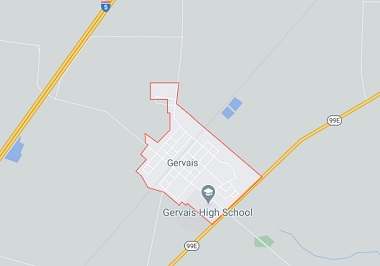

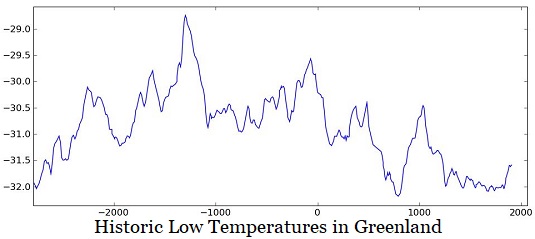
 .
With future funding from the United Nations at stake, Penn State, East Anglia and many other universities wouldn’t acknowledge that their theory relating CO2 levels to temperature was incorrect. Choosing to follow their funding versus following the science these IPCC members proceeded to alter temperature readings from around the globe. They were caught in the coverup. That was called Climategate, it occurred in 2009 and resulted in the dismissal of the head of the IPCC. After that the UN/IPCC dropped the reference to global warming and adopted the term climate change.
.
With future funding from the United Nations at stake, Penn State, East Anglia and many other universities wouldn’t acknowledge that their theory relating CO2 levels to temperature was incorrect. Choosing to follow their funding versus following the science these IPCC members proceeded to alter temperature readings from around the globe. They were caught in the coverup. That was called Climategate, it occurred in 2009 and resulted in the dismissal of the head of the IPCC. After that the UN/IPCC dropped the reference to global warming and adopted the term climate change.
 There is a third false premise involved here as well. That is that humans can control the level of CO2 on Earth. One volcanic emissions can equal the CO2 created by all humans each year and we have hundreds of volcanic events both above and below the sea each year. Do any of those legislators or those they speak for have the requisite science background to act with authority on proposed climate legislation? Do they presume their scare tactics have worked? Do they presume skeptics are too intimidated to speak up?
There is a third false premise involved here as well. That is that humans can control the level of CO2 on Earth. One volcanic emissions can equal the CO2 created by all humans each year and we have hundreds of volcanic events both above and below the sea each year. Do any of those legislators or those they speak for have the requisite science background to act with authority on proposed climate legislation? Do they presume their scare tactics have worked? Do they presume skeptics are too intimidated to speak up?
